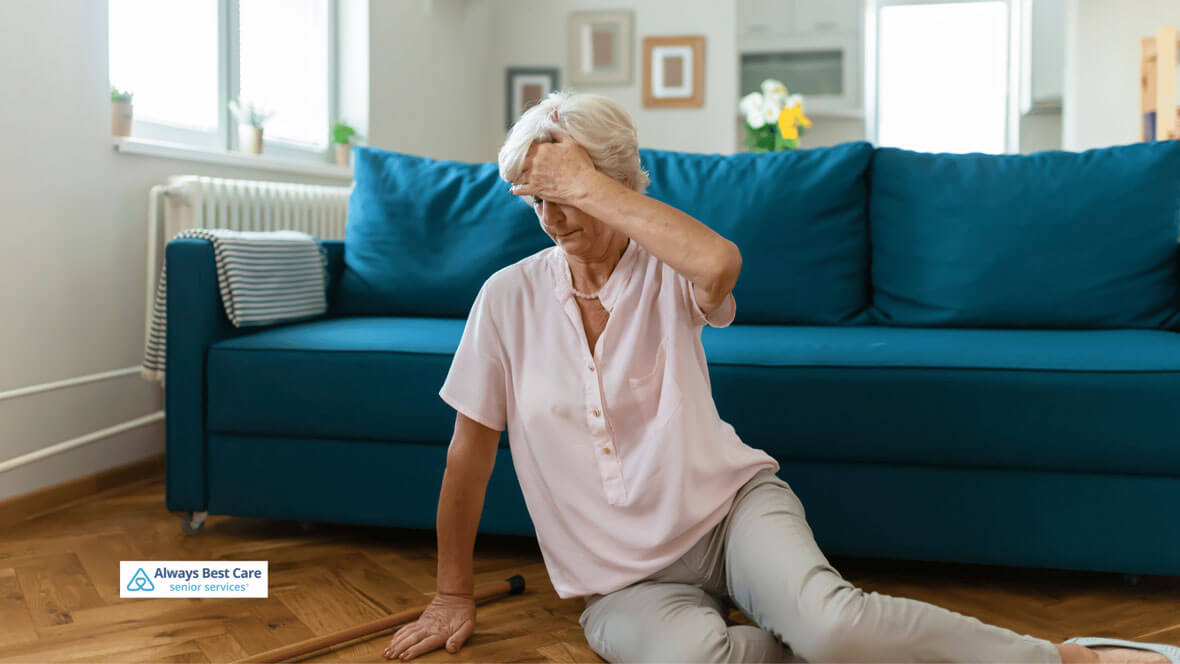9 Commonly Overlooked Fall Risks for Seniors

As we age, our risk of falling increases, making it important to identify hidden hazards in our homes.
A fall can lead to serious injury, but many falls are preventable.
Here are 9 hidden fall hazards for seniors and how to avoid them to keep your home safer.
Table of Contents
The Importance of Home Safety for Seniors
Falls are a leading cause of injury for seniors, and many of these accidents happen right at home. A fall can not only cause physical injury but also create fear and anxiety about living alone, leading to a loss of confidence in everyday activities.
Simple changes, like improving lighting or rearranging furniture, can dramatically reduce the risk of falls. Home safety should be a priority for seniors and their families for physical health and to maintain independence.
1. Poor Lighting
Insufficient lighting makes it harder to see obstacles and changes in floor level. Dimly lit hallways, stairwells, and entryways pose a significant risk for seniors.
To reduce this hazard, ensure all areas of your home are well-lit, especially walkways and stairs. Consider adding night lights or motion-sensor lighting in frequently used areas to help prevent falls.
2. Loose Rugs and Carpets
Rugs and improperly fastened carpets can easily slip and cause a fall. It’s common for seniors to trip over curled rug edges or loose mats.
Use non-slip backing on rugs or secure them with double-sided tape to prevent sliding. If possible, remove loose rugs altogether to eliminate the risk.
3. Slippery Bathroom Floors
The bathroom is one of the most dangerous places for falls due to water on the floor. Slippery tiles after a shower can quickly lead to accidents.
Place non-slip mats in the tub and floor to prevent falls. You can also install grab bars near the toilet, shower, or tub to provide stability and a secure place to hold onto when stepping in and out.
4. Cluttered Walkways
Clutter in walkways creates obstacles that are easy to trip over. Whether it’s shoes, magazines, or electrical cords, items left in high-traffic areas pose a serious risk for seniors.
Keep floors clear by organizing clutter and storing items in cabinets or shelves. Ensure pathways to frequently used areas like the bathroom and bedroom are free of obstacles.
5. Unstable Furniture
Leaning on furniture for support can be dangerous if the furniture is not stable. Chairs with wobbly legs, unsteady tables, or shelves can tip over if used for balance.
Check all furniture in your home to make sure it’s sturdy. If something is unstable, repair it or consider replacing it with a safer option.
6. Improper Footwear
Wearing shoes that don’t fit properly or walking around in socks can increase the chance of slipping.
Seniors should always wear well-fitted, non-slip shoes when moving around the house. Avoid slippers with smooth soles or flip-flops, which offer little grip and stability.
7. Lack of Handrails
Handrails are essential for preventing falls, especially on stairs, but many seniors don’t consider installing them in other key areas of the home. You may already have handrails in the stairwell or along your front steps, but it’s equally essential to have grab bars in the bathroom.
Installing grab bars near the toilet, shower, and tub gives you something to hold onto if the floor is slippery or if you need extra support when standing up or sitting down.
8. Pets
As much as you love your dog or cat, they can become a tripping hazard. Pets can be unpredictable, often darting around or getting underfoot.
Train your dog to respond to commands like “sit” or “stay” to help keep them out of your way. Before getting up or walking, check where your pet is to avoid stepping on or tripping over them. Keep your pet’s bedding, food, water dishes, and toys cleaned up and stored out of walking paths.
9. Medication Side Effects
Certain medications can cause dizziness, drowsiness, or balance issues, increasing the risk of falls.
Your doctor may adjust your medication or suggest alternatives to help you feel more steady.
How Always Best Care of Baton Rouge Can Help
At Always Best Care of Baton Rouge, we understand how crucial it is to create a safe environment for seniors at home.
Our dedicated caregivers are trained to recognize potential hazards and provide the support needed to reduce the risk of falls. From assisting with daily activities to offering companionship, our caregivers can help seniors stay safe while maintaining their independence.
Whether it’s organizing clutter, providing assistance in the bathroom, or even offering guidance on safe footwear, Always Best Care offers peace of mind to seniors and their families.
Other Essential Safety Tips for Seniors
In addition to removing physical hazards, consider adopting a few extra habits to improve safety.
Regular vision and hearing check-ups can help seniors navigate their surroundings more effectively.
Stay active with exercises designed to improve balance and strength, which can help prevent falls.
Finally, have a plan in place in case of an emergency. Make sure a phone is always within reach, or consider using a medical alert system for immediate assistance if a fall does happen.
Take the Next Step toward a Safer Home with Always Best Care of Baton Rouge!
Falls don’t have to be a part of aging. Recognizing these hidden hazards and removing/reducing them can create a safer environment and prevent injuries. Regularly assess your home for potential risks and take proactive measures to ensure it remains a safe space for you or your loved ones. Always Best Care of Baton Rouge is here to help make your home safer and provide the care needed to enjoy life confidently.
Contact us at (225) 513-8656 to learn more and schedule your free consultation!





